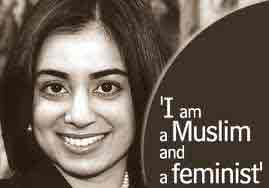| Islam, Women and Feminism | |
| 01 Jun 2011, NewAgeIslam.Com |
| Of Face Veils, Bans and Talaq: Voices from an Islamic Feminist Conference | ||
Photo: Writer Asma Gull Hasan, author of books on her view of Islam and feminism | ||
| Of Face Veils, Bans and Talaq: Voices from an Islamic Feminist Conference | |
May 29, 2011 Every time the fatwa brigade of Darul Uloom Deoband or any other patriarchal seminary delivers a regressive diktat, Zakia Soman is among the first to react. Tearing into the mullahs’ ruling over a variety of issues, including the length of Sania Mirza’s tennis skirt, Soman raises a banner of protest. She symbolizes a liberated, albeit miniscule, voice among Muslim women who mostly lead (or are forced to lead) a segregated, secluded life. Education might have propelled a section among Muslim women to step out of their homes, but the orthodox clergy continues to consider them inferior to men. Soman provides an antidote to such medieval mentality. Soman was among a group of Islamic feminists who congregated at Shimla’s historic Indian Institute of Advanced Study, once the summer retreat of the Viceroys and post-Independence Presidents of India. The institute, perched atop a hill and overlooking a verdantly green valley, saw ample verbal fireworks. A dozen or so participants, mostly women activists experienced in fighting misogynist mullahs, exchanged views, cracked jokes and slammed the sermonizing clergy. Recounting acts of rebellion, many remembered the calumny they suffered for opposing oppressive patriarchy and for calling the bluff of the champions of orthodox Islam. These feminists are not the bra or burqa-burning type. They believe in the core values of Islam, yet want to remove the cobwebs in the path of Muslim women. “We work under the framework of Islamic principles and Indian constitution,” declares Soman, one of the founding members of Bhartiya Muslim Mahila Andolan, an advocacy group that has 24,000 members across the country. The biggest achievement of Andolan, Soman says, is that now government agencies invite its members before framing schemes aimed at uplifting Muslim women. Like Soman, most feminists are interventionists. Faizur Rahman, a Chennai-based civil engineer-turned-real estate developer, is an unlikely feminist. He has earned comforts for himself and his family through constructing homes, but finds “peace” only after he has cogently reposted cruel acts by Islamic extremists. Having launched Forum for the Promotion of Moderate Thought among Muslims a couple of months ago, Rahman is reclaiming Islam from the clutches of the jihadis. “I was among the few Muslims who strongly condemned the killing of Punjab governor Salman Taseer,” says Rahman. Like other feminists, Rahman too has studied Islam and opposes the misogynism of orthodox ulema. Taketalaq. Nowhere, Rahman claims, does the Quran say that talaq can be given in one sitting. “We tell Muslims to follow what the Quran and the Hadith say, and not man-made customary laws,” he says. In fact, the Muslim Personal Law Board drew much flak at the Shimla meet. Senior Hindi journalist Nasiruddin Haider Khan traced the circumstances in which the Board was founded in the 1970s in Mumbai and questioned its legitimacy to be a representative of the Muslims. “It is a self-appointed guardian who rushes to rescue the Sharia every time it smells danger,” explains Khan, who attacked the Board for its many misadventures, including forcing the Rajiv Gandhi government to frame an act which denies alimony to divorced Muslim women. The debate over Burqa or face veil is every Islamic feminist’s favourite topic. It was debated at Shimla as well. The feminists concluded that the face veil, which is more a custom-commanded practice rather than a divine law, must not pull Muslim women out of the public arena. “Face veil is not Quran-commanded. Quran only wants women to dress modestly. So why should Muslim women conform to donning the Talibani top-totoe burqa?,” asks Sheeba Aslam Fehmi, a young researcher from Delhi’s Jawaharlal Nehru University. The combative assertion can easiy earn her a few fatwas, but she is undeterred. “Let there be fatwas on me,” dares Fehmi, who also opposes the continued “injustice” to Bangladeshi writer Taslima Nasreen who has been unsuccessfully seeking Indian citizenship. Source: The Times of India Photo: Writer Asma Gull Hasan, author of books on her view of Islam and feminism
URL: http://www.newageislam.com/NewAgeIslamIslamWomenAndFeminism_1.aspx?ArticleID=4753 |




 The debate over Burqa or face veil is every Islamic feminist’s favourite topic. It was debated at Shimla as well. The feminists concluded that the face veil, which is more a custom-commanded practice rather than a divine law, must not pull Muslim women out of the public arena. “Face veil is not Quran-commanded. Quran only wants women to dress modestly. So why should Muslim women conform to donning the Talibani top-totoe burqa?,” asks Sheeba Aslam Fehmi, a young researcher from Delhi’s Jawaharlal Nehru University. The combative assertion can easiy earn her a few fatwas, but she is undeterred. “Let there be fatwas on me,” dares Fehmi, who also opposes the continued “injustice” to Bangladeshi writer Taslima Nasreen who has been unsuccessfully seeking Indian citizenship. --
The debate over Burqa or face veil is every Islamic feminist’s favourite topic. It was debated at Shimla as well. The feminists concluded that the face veil, which is more a custom-commanded practice rather than a divine law, must not pull Muslim women out of the public arena. “Face veil is not Quran-commanded. Quran only wants women to dress modestly. So why should Muslim women conform to donning the Talibani top-totoe burqa?,” asks Sheeba Aslam Fehmi, a young researcher from Delhi’s Jawaharlal Nehru University. The combative assertion can easiy earn her a few fatwas, but she is undeterred. “Let there be fatwas on me,” dares Fehmi, who also opposes the continued “injustice” to Bangladeshi writer Taslima Nasreen who has been unsuccessfully seeking Indian citizenship. -- Moderate Islamist here
Moderate Islamist here


0 comments:
Post a Comment